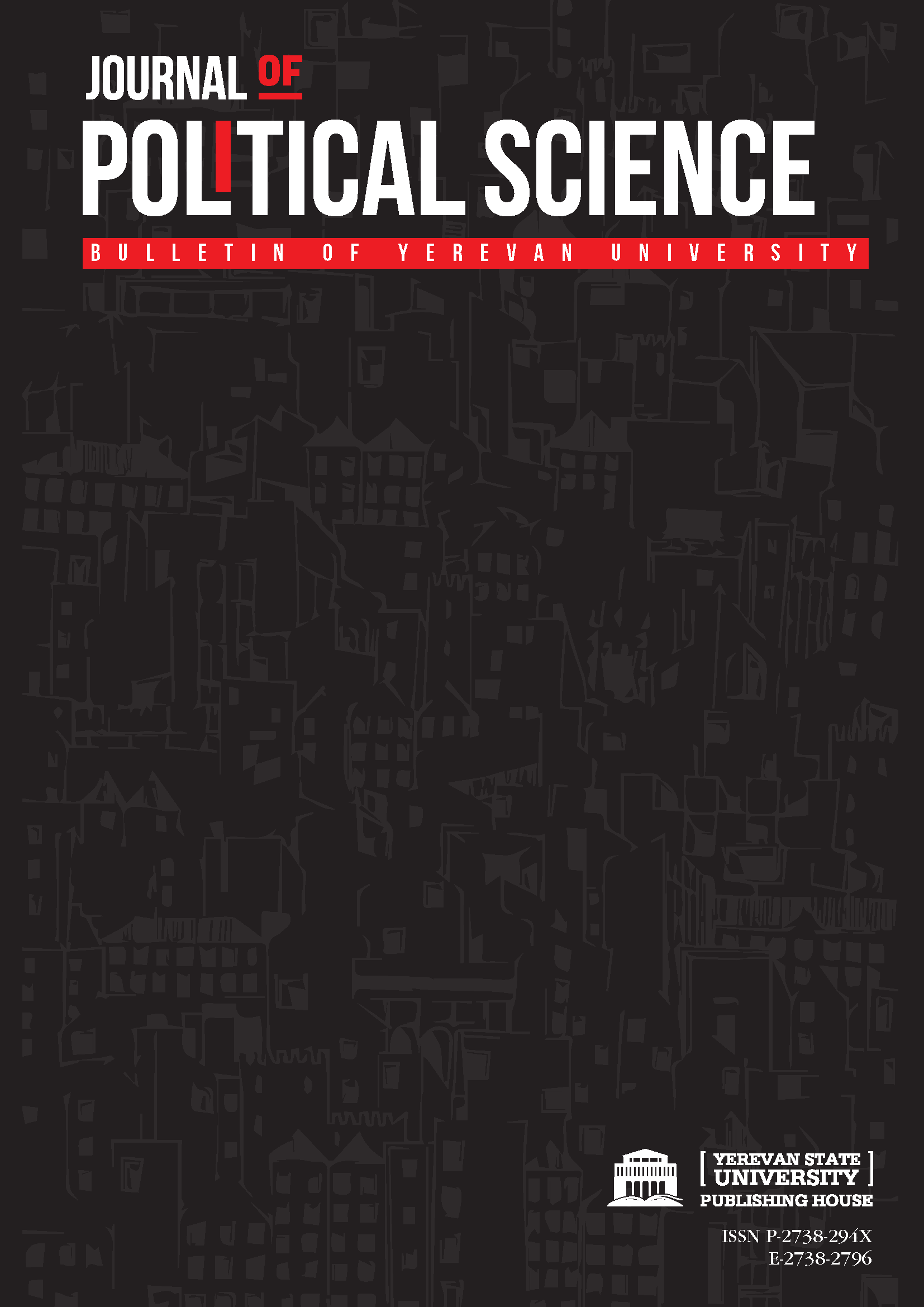Political Science Perceptions of Post-Soviet Civic Participation: Reconciliation Steps or an Attempt at Imitation?
DOI:
https://doi.org/10.46991/JOPS/2022.1.1.069Keywords:
post-Soviet political participation, political socialization, participatory culture, transformation, network participation, electoral process, institutionalization, democratization, civic engagementAbstract
In the study of the perceptions of post-Soviet political participation, the article substantiated the study of the issue of political participation, the theoretical bases of the analysis of political participation in the stage of democratic consolidation. We concluded that due to the transformation of the society, non-traditional participatory actions are becoming more widespread, which largely testifies to the high level of civic consciousness of the society. Political participation is an institutional mechanism for establishing a democratic state and implementing policy, studying the activities of policy actors in different manifestations of behavior. It is very important that everyone involved in social and political life has some knowledge of the culture of participation, social and psychological training. In the conditions of globalization, it is impossible to imagine the establishment of a democratic political system without the realization of citizens’ rights.
References
Aleksanyan, Arusyak, and Ashot Aleksanyan. 2021. Political Stability Challenges in the EEU countries: Political Factors Index. Yerevan: YSU Press. https://doi.org/10.46991/YSUPH/9785808425200.
Aleksanyan, Ashot. 2019. “Trade Unions as an actor of regional citizenship and European social integration of the South Caucasus.” EUCACIS Online Paper 5: 1-13.
Almond, Gabriel A. 2015. “Introduction: A Functional Approach to Comparative Politics.” In: The Politics of the Developing Areas, edited by Gabriel Abraham Almond, and James Smoot Coleman, 1-64. Princeton: Princeton University Press. https://doi.org/10.1515/9781400866977-003.
Babajanian, Babken V. 2005. “Civic participation in post-Soviet Armenia.” Central Asian Survey 24 (3): 261-279. https://doi.org/10.1080/02634930500310345.
Bell, Curtis. 2011. “Buying Support and Buying Time: The Effect of Regime Consolidation on Public Goods Provision.” International Studies Quarterly 55 (3): 625-646. https://doi.org/10.1111/j.1468-2478.2011.00664.x
Birch, Sarah. 2011. “Post-Soviet Electoral Practices in Comparative Perspective.” Europe-Asia Studies 63 (4): 703–725. https://doi.org/10.1080/09668136.2011.566431
Dalton J. Russell. 2008. “Citizenship Norms and the Expansion of Political Participation.” Political Studies 56 (1) (March): 76-98. https://doi.org/10.1111/j.1467-9248.2007.00718.x.
Ekman, Joakim, and Erik Amnå. 2012. “Political participation and civic engagement: Towards a new typology.” Human Affairs 22 (3): 283-300. https://doi.org/10.2478/s13374-012-0024-1.
Herz, John H. 1978. “Legitimacy: Can We Retrieve It?” Comparative Politics 10 (3): 317-343. https://doi.org/10.2307/421707.
Linz, Juan J., and Alfred Stepan. 1996. “Toward consolidated democracies.” Journal of democracy 7 (2) (April): 14-33. https://doi.org/10.1353/jod.1996.0031
Merrifield, John. 1993. “The institutional and political factors that influence voter turnout.” Public Choice 77: 657-667. https://doi.org/10.1007/BF01047865.
Milbrath, Lester W. 1981. “Political Participation.” In: The Handbook of Political Behavior, edited by Samuel L. Long, 197-240. Springer, Boston, MA. https://doi.org/10.1007/978-1-4684-3878-9_4.
Parvin, Phil. 2018. “Democracy Without Participation: A New Politics for a Disengaged Era.” Res Publica 24: 31-52. https://doi.org/10.1007/s11158-017-9382-1.
Przeworski, Adam. 1991. Democracy and the Market: Political and Economic Reforms in Eastern Europe and Latin America. Cambridge: Cambridge University Press. https://doi.org/10.1017/CBO9781139172493.
Saikkonen, Inga A-L. 2017. “Electoral Mobilization and Authoritarian Elections: Evidence from Post-Soviet Russia.” Government and Opposition 52(1): 51-74. https://doi.org/10.1017/gov.2015.20.
Scammon, Richard M. 1967. “Electoral Participation.” The ANNALS of the American Academy of Political and Social Science 371 (1) (May): 59-71. https://doi.org/10.1177/000271626737100104.
Schaffer, Frederic C. 2008. The Hidden Costs of Clean Election Reform. Ithaca & London: Cornell University Press.
Talò, Cosimo, and Terri Mannarini (2015) “Measuring Participation: Development and Validation the Participatory Behaviors Scale.” Social Indicators Research 123 (3): 799-816. https://doi.org/10.1007/s11205-014-0761-0
Downloads
Published
How to Cite
Issue
Section
License
Copyright (c) 2022 Arnak Sargsyan

This work is licensed under a Creative Commons Attribution-NonCommercial 4.0 International License.







